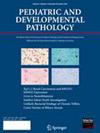母体巨细胞病毒 (CMV) 血清学:CMV IgM 和 IgG 阳性在检测先天性 CMV 感染中的诊断局限性
IF 1.3
4区 医学
Q3 PATHOLOGY
引用次数: 0
摘要
导读:先天性巨细胞病毒(cCMV)是一种常见的先天性病毒感染。cCMV 检测通常从评估母体 CMV 血清学开始,特别是 IgM 和 IgG 抗体。母体 CMV IgM 阴性表明母体近期感染 CMV 的风险较低,因此胎儿感染 cCMV 的风险也较低。方法:在我们的围产期尸检和胎盘病理学数据库中,我们发现了 5 例在第二孕期母体 CMV IgM 阴性的情况下仍感染了 cCMV 的病例。结果:在所有 5 例病例中,胎儿畸形都是在第二孕期首次通过超声检查发现的,这促使我们进行了母体 CMV 检测。由于所有病例的第二孕期母体 CMV IgM 均为阴性,因此认为 cCMV 的可能性不大,从而排除了对其中 4 个病例进行进一步的产前 CMV 检测。随后通过胎盘和/或尸检确诊为 cCMV。在确诊后,对 3 个病例储存的冷冻初产妇血样进行了 CMV 血清学和 IgG 阳性检测。其中,2 个病例的初产妇血样为 IgG+、IgM+,且 IgG 阳性较低,这表明母体在受孕前后感染了原发性 CMV。结论:妊娠后三个月母体 CMV IgM 阴性不能排除 cCMV 感染。虽然 CMV IgG 阳性检测和对储存的冷冻初产妇血液样本的分析能提供有价值的信息,但它们也有局限性。对羊水进行 CMV PCR 是一种有用的产前诊断工具。对于原因不明的胎儿畸形或死亡病例,建议进行尸检和胎盘检查。本文章由计算机程序翻译,如有差异,请以英文原文为准。
Maternal Cytomegalovirus (CMV) Serology: The Diagnostic Limitations of CMV IgM and IgG Avidity in Detecting Congenital CMV Infection
Introduction:Congenital cytomegalovirus (cCMV) is a common congenital viral infection. Testing for cCMV usually begins with assessing maternal CMV serology, specifically IgM and IgG antibodies. A negative maternal CMV IgM suggests a low risk of recent maternal CMV infection, thereby suggesting a low risk of cCMV in the fetus. Consequently, cCMV is often ruled out when maternal CMV IgM is negative.Methods:In our perinatal autopsy and placental pathology database, we identified 5 cases of cCMV despite negative maternal CMV IgM results in the second trimester.Results:In all 5 cases, fetal abnormalities were first detected by ultrasound in the second trimester, prompting maternal CMV testing. Since second trimester maternal CMV IgM was negative in all cases, cCMV was considered unlikely, thus precluding further prenatal CMV testing in 4 of these cases. The diagnosis of cCMV was subsequently made through placental and/or autopsy examinations. Following this diagnosis, retrospective CMV serology and IgG avidity testing was performed on stored frozen first-trimester maternal blood samples in 3 cases. Among these, the first-trimester samples in 2 cases were IgG+, IgM+, and exhibited low IgG avidity, suggesting a primary maternal CMV infection around the time of conception. In the third case, both first and second-trimester maternal blood samples were IgG+, IgM−, and showed high IgG avidity, suggesting a non-primary maternal CMV infection (i.e., reactivation or reinfection of CMV).Conclusion:A negative maternal CMV IgM in the second trimester cannot exclude cCMV infection. While CMV IgG avidity testing and analysis of stored frozen first-trimester maternal blood samples provide valuable insights, they have limitations. CMV PCR performed on amniotic fluid is a useful prenatal diagnostic tool. For cases of unexplained fetal abnormalities or death, autopsy and placental examination are recommended.
求助全文
通过发布文献求助,成功后即可免费获取论文全文。
去求助
来源期刊
CiteScore
3.70
自引率
5.30%
发文量
59
审稿时长
6-12 weeks
期刊介绍:
The Journal covers the spectrum of disorders of early development (including embryology, placentology, and teratology), gestational and perinatal diseases, and all diseases of childhood. Studies may be in any field of experimental, anatomic, or clinical pathology, including molecular pathology. Case reports are published only if they provide new insights into disease mechanisms or new information.

 求助内容:
求助内容: 应助结果提醒方式:
应助结果提醒方式:


